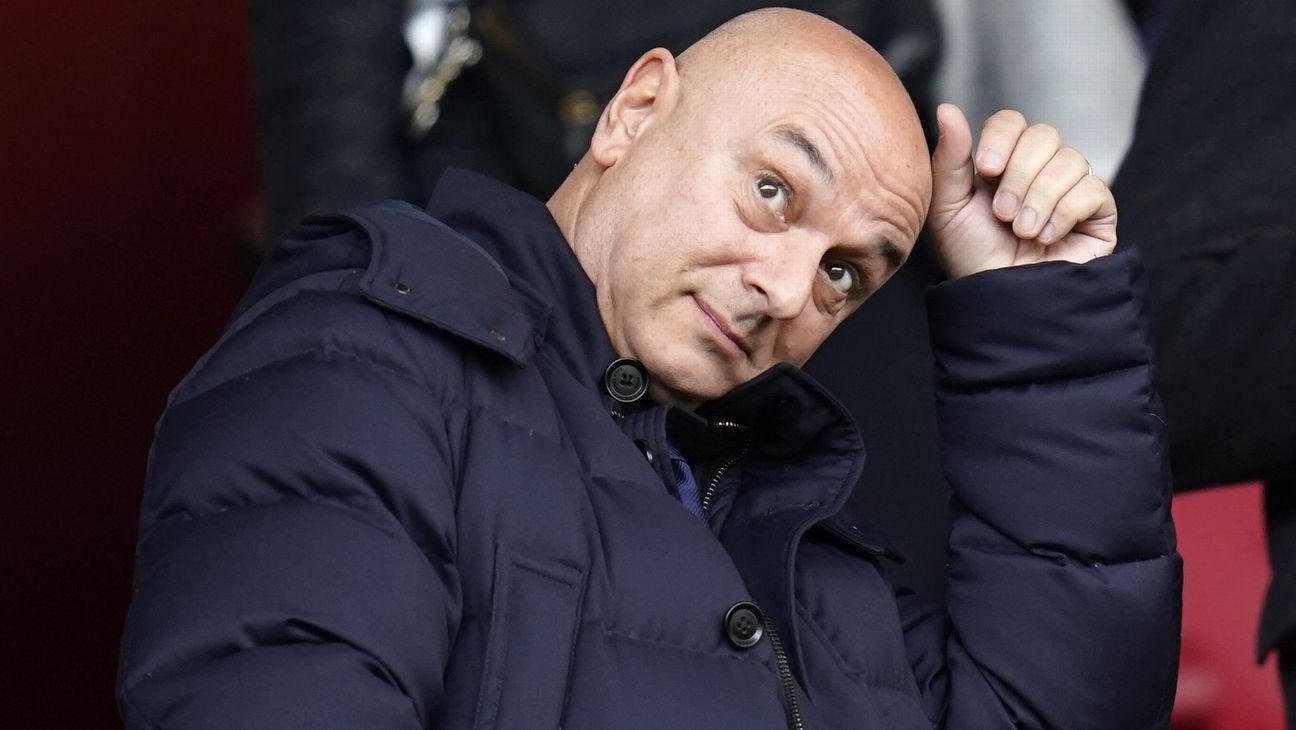Daniel Levy has appointed 11 full-time managers at Tottenham Hotspur and fired every single one of them, with Antonio Conte the latest through the exit door after the club confirmed his inevitable departure on Sunday night. Conte is simply the latest high-profile coach to be the fall guy for the longest-serving chairman in the Premier League.
Sooner or later, there will be a 12th appointment. It could be Julian Nagelsmann, out of work since being fired by Bayern Munich last week, or Levy might opt to hire Mauricio Pochettino for a second time. Oliver Glasner, the Eintracht Frankfurt head coach, is another candidate having guided the German club to Europa League success last season.
No matter who succeeds former Chelsea, Juventus and Inter Milan coach Conte at Spurs, he will have to crack the code of working with Levy and achieving his lofty ambitions. He will also be expected to do it without the ability to compete financially with Tottenham’s Big Six rivals. And if he fails, it won’t be the players or Levy who pay the price. That’s how it worked out for Conte, Jose Mourinho, Harry Redknapp, Andre Villas-Boas and so many others, even Pochettino who guided Spurs to a Champions League final in 2019.
– Stream on ESPN+: LaLiga, Bundesliga, more (U.S.)
Levy, who assumed his role in February 2001, is not unique in removing the manager when storm clouds gather above his club. In football, it is usually too expensive to clear out a squad of under-performing players, while the chair or chief executive rarely accepts culpability for recurring failures by removing themselves from their position. Firing the manager is generally the quickest, easiest and least expensive option.
You will often read of eye-watering compensation figures paid out to sacked managers. Mourinho received a £16 million payoff when he left in April 2021, less than a week before Spurs were due to play Manchester City in the Carabao Cup final, but that amounts to the transfer fee for a second-choice full-back nowadays. Imagine how much it could cost to get rid of 8-10 players and replace them at the same time? That’s why managers are the first to go when times get tough.
Levy’s decisions throughout his 22 years deserve greater scrutiny. Removing Conte seemed a foregone conclusion following his cutting remarks about the mentality and desire of Tottenham’s players after the recent 3-3 draw at Southampton, but it didn’t have to be.
Spurs are fourth in the Premier League and on course for Champions League qualification, despite a season that has been disrupted on a personal level for Conte by the death of the club’s fitness coach Gian Piero Ventrone and other close friends, the ex-Fiorentina and AC Milan coach Sinisa Mihajlovic and former Juventus team-mate Gianluca Vialli. Conte also missed five Spurs games following gall bladder surgery in February.
To still be in fourth, in spite of all of the above, was a testament to Conte’s work, but the bruised egos of too many players led Levy to calculate that removing Conte now would ensure a happier squad and a greater possibility staying in the Champions League places.
Removing a proven coach and replacing him with Cristian Stellini, Conte’s assistant at Spurs, Inter and Juventus, for the final 10 games of the season is a high stakes gamble, but a clear win for the players who have seen off the ultra-demanding multi-club title winner in Conte.
Levy deployed the same tactic when firing Mourinho, replacing him with rookie coach Ryan Mason, who was just 29 at the time, for the remainder of the 2021-22 campaign. Mourinho had taken Spurs to the Carabao Cup final, but it was Mason who had to face Pep Guardiola at Wembley in an obvious coaching mismatch. Spurs lost 1-0.
Perhaps Mourinho was sacked to avoid the prospect of him delivering Tottenham’s first trophy in 13 years and then being told his time was up. It was so much easier for Levy to sack him first and hope for Mason to achieve a fairy-tale success. Similar applies to Conte now; better to do it before he qualifies for the Champions League and then asks for a new contract.
By backing the players over the manager, Levy took the easy option with both Mourinho and Conte. It was a similar story when he hired Nuno Espirito Santo as coach in June 2021.
Sources have told ESPN that Levy was urged to consider Graham Potter at the time, then making a name for himself as a rising star in coaching at Brighton, while Erik ten Hag was interviewed and ruled out because the then-Ajax coach was deemed to not have the right personality for the Spurs job.
Whether “right personality” is code for Ten Hag being a demanding coach with exacting standards, as he is now showing at Manchester United, can only be answered by Levy, but the out-of-work Espirito Santo was the easy option and clearly the wrong one considering he was sacked after just 17 games.
Looking further back, Jacques Santini lasted just 13 games as manager in 2004 after being hired by Levy to replace club legend Glenn Hoddle. Juande Ramos was appointed in 2007 but gone in less than a year, despite winning Tottenham’s only trophy (the League Cup) this century. Villas-Boas was removed within 18 months of his appointment in another case of the players getting their way when they decided his methods weren’t to their liking.
Santini, Ramos and Villas-Boas all arrived at Spurs with big reputations, while Mourinho and Conte had even more impressive track records, but none of them were given the time to get things right before Levy decided to make a change.
